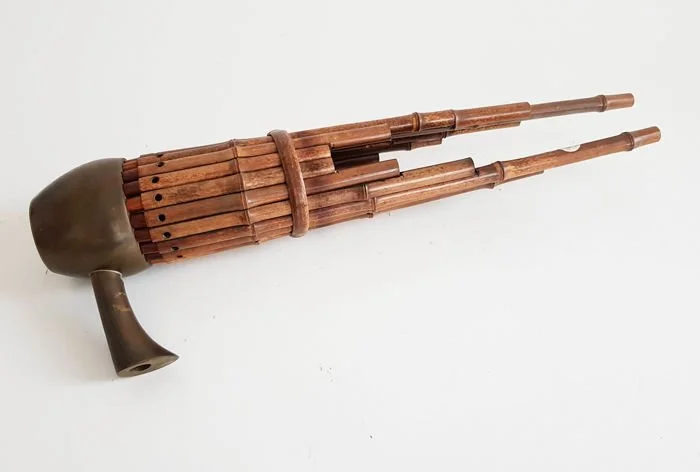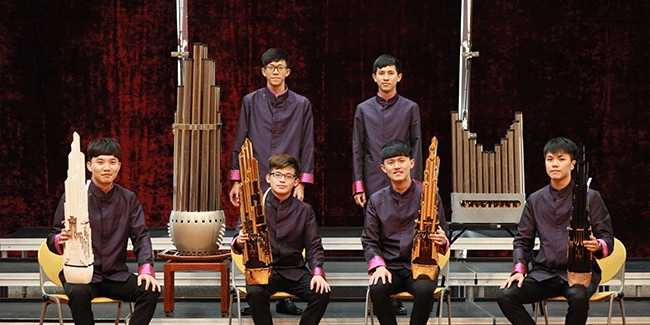A traditional Chinese instrument, representing natural harmony and life from the ground (made originally from bamboo), dating back at least 3,000 years, it could be described as a complex form of mouth organ played by breathing in and out, with a free reed, finger holes and keys, mouthpiece and vertical pipes. It is traditionally used as a main instrument in kunqu and some other forms of Chinese opera, solo suona or dizi performances from the slow and emotional to the fast and sprightly. The sheng has also been used by few non-Chinese composers, including Unsuk Chin, Lou Harrison, Tim Risher, Daníel Bjarnason, Guus Janssen and Christopher Adler. The instrument was not brought to Europe until around the 17th century.
An older, more traditional bamboo sheng
The instrument range in many sizes, from the traditional, which has around 17 pipes, to larger versions – soprano, alto, tenor, bass. and fully keyed modern versions, which can 37-reed sheng all the way to 53-reed.
Taiwanese players with different sheng sizes
In this comprehensive video, virtuoso sheng player Wu Wei demonstrates the versatility of his instrument, more about its meaning, and how to prepare the reed, as well as tuning it (including how and where to pour hot water in) and playing in different styles:
Further demonstrations here by a member of the Yuan-Yun Chinese Chamber Orchestra:
And here is a very evoative collaborative piece, "Harmonium Mountain II," created by Clifford Ross and player Wu Tong, who introduces it, with slow notes and very fast staccato:
And now here’s a traditional accompanied piece but written specifically for the instrument, A Night at Mountain Village, by the composer and sheng player Zhiliang Zhang. Challenging to play, it includes the polyphonic technique, encompassing a wide range of intervals:
And in this sonata performance, a beautiful piece titled The Butterfly Lovers, by Hung Shao-Huan, featuring He Shufeng:
So then, any more pieces featuring the distinctive sound of the theorbo? Feel free to share any further ones from any form of music, or even film, art or other contexts in comments below.
You can also get in touch the contact page, and also visit us on social media: Song Bar Twitter, Song Bar Facebook. Song Bar YouTube. and Song Bar Instagram. Please subscribe, follow and share. New to comment? It is quick and easy. You just need to login to Disqus once. All is explained in About/FAQs ...
Song Bar is non-profit and is simply about sharing great music. We don’t do clickbait or advertisements. Please make any donation to help keep the Bar running:



